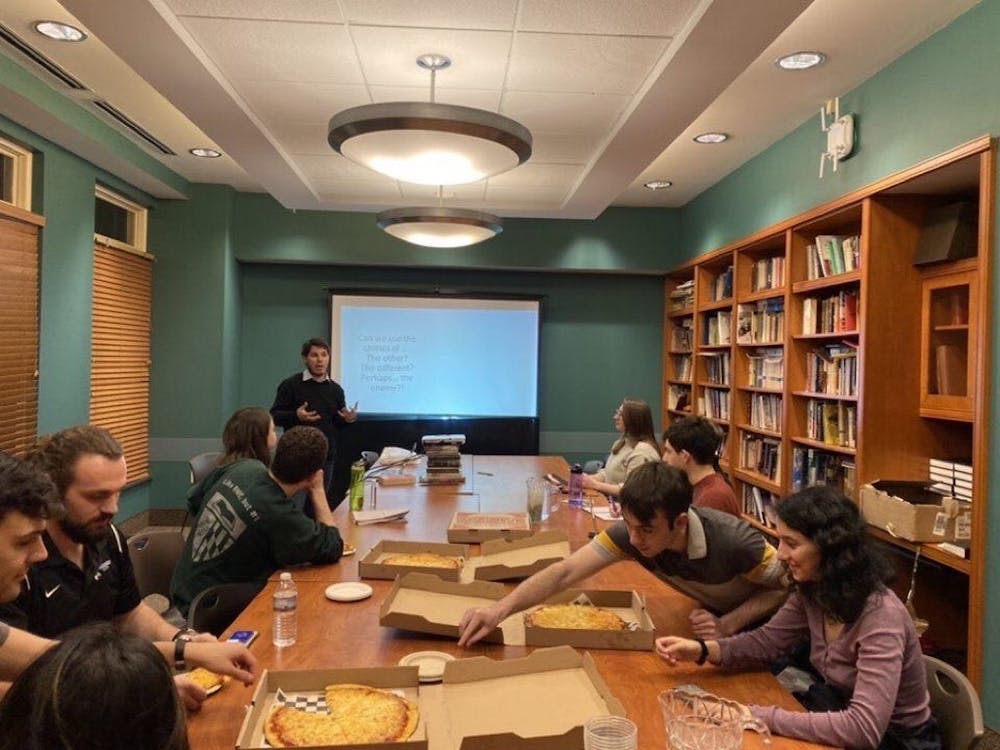Giacomo Loi hosted a seminar that connected Greek mythology to the Jewish tradition at Hopkins Hillel last Thursday. Loi is pursuing a PhD in the Department of Classics and has spent time all over Europe and Israel.
Loi began his discussion by providing some classical context to his work.
He stated that the ability to shape a world with language is a uniquely human trait, and that history belongs collectively to people. He linked this understanding of history with Jewish history by explaining how a culture can use the stories of another group to share its own experiences.
Loi described how a colonized person uses English as a tool to verbalize their own story, imploring the audience to instrumentalize this tool with Jewish identity.
“What the colonizer gave me was a language. They impose it on me. But now I’m going to use it against them. They gave me a tool, I’m going to use it to tell everybody the real story,” Loi said. “I want you to be a story thief. I want you to see it is possible to steal stories to tell our own identity. And this I want you to do especially with the Jewish identity,” Loi said.
Loi then provided some historical context for the oppression of Jewish people.
He stated that neighboring empires forced Ancient Greek culture and customs on the Jewish people while they were occupied. He also spoke about the Roman capture of Jerusalem and the subsequent destruction of the Temple of Jerusalem.
Loi added that a cultural diffusion took place between the Jewish peoples and the Romans and Ancient Greeks, despite their negative relationship.
“The relationship between the Jews and the Greeks and the Romans in the ancient world wasn’t that good,“ Loi said. “Why am I talking about them together? Because at some point they coalesced in one culture.”
He also stated that the groups shared classical myths, but Nazis and other fascist groups appropriated ancient Greco-Roman culture.
He cited the Sisyphus myth as an example of this phenomena. Loi explained that in Greek mythology, the cruel Greek king Sisyphus was punished in the afterlife by having to roll a large boulder up to the top of a hill that would then roll down for eternity.
Loi stated that the Nazis were inclined by this myth to force some prisoners to climb “Stairs of Death” while holding huge boulders, often killing them.
Loi also spoke of The Odyssey, and connected the actions of Odysseus’ wife Penelope to a more contemporaneous story written by a Holocaust survivor. According to Loi, Penelope waits 20 years for her husband to come back from war and fended off other male suitors by weaving a garment. She tells the suitors that she will remarry once she is done weaving but unweaves the garment every night to remain loyal to her husband.
Loi explained that a similar narrative can be seen in a novel written by Aharon Appelfeld, a Holocaust survivor who escaped from a labor camp as a young boy.
Loi stated that in one of his stories, “Berta,” Appelfeld tells the story of two Holocaust survivors. While the male character, Maxie, constantly travels, the female character, Bertha, stays in place and knit sweaters, repeatedly unraveling the sweaters and reproducing them.
Loi explored Appelfeld’s intent in writing about the tensions in the soul of the Holocaust survivor.
“So this is one tension, that you always go back to the past, that you don’t move from there. This is the kind of thing that Bertha is doing,“ Loi said.
He stated that the other tension was that no one in Israel would talk about Holocaust survivors, which the character of Maxie demonstrates.
“What Appelfeld is trying to do is humanize the figure of the survivor. It’s to say that we lead a difficult life, and just because we weren’t born here in Israel and because we have two different tensions in ourselves, one is to flee this past and one is to treasure it so much that we can not be free, that we can not go forward,” Loi said.
Junior Tali Lesser felt that the event opened her eyes to a new connection between mythology and the Holocaust.
“I wasn’t aware that Israelis had taken Greek mythology and written novels that represented it through the lens of the Holocaust. It was a parallel that I never knew existed, so I never knew that there was this dichotomy,“ Lesser said. “The mythology that we talked about really made a lot of sense, with the metaphors that exist.”
Senior Adam Mark said that Loi’s talk intrigued him.
He said that he had not known before that different Jewish writers had used classical mythology to identify with their traumatic histories.
“It’s interesting to see how people in dealing with their trauma take meaning from all kinds of different mythologies, even myth that doesn’t belong to their heritage, and use it to deal with their trauma,” Mark said.
Loi explained that he aimed to share his findings to demonstrate that such a unique connection between mythology and trauma can exist.
“I thought that the Holocaust was one of the main stories of the Jewish people and I thought that it is even possible that the Jewish people took into consideration a Greek or Roman story...to talk about such an important thing in their identity,” Loi said. “I found some proofs of that and I wanted to share them with the wider community.”





